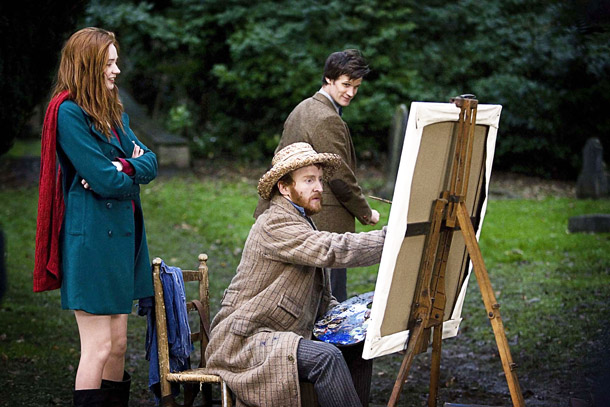Doctor Who Interview: Richard Curtis
None
SFX chats to the writer of this coming Saturday’s “Vincent And The Doctor”

The National Film Theatre on London’s South Bank was the setting for yesterday’s sneaky preview screening of “Vincent And The Doctor”, this Saturday’s episode of Doctor Who . Teaming the Doctor with legendary painter Vincent Van Gogh, it’s written by Richard Curtis ( Four Weddings And A Funeral , Blackadder , Love Actually ) and SFX was there to hear him talk about writing this much-anticipated episode…
This is quite a departure for you. What kind of freedom do you have when you’re writing for Doctor Who ?
“I think God said, ‘Service is perfect freedom…’ So it was quite pleasurable. I was very free – because I came up with the story and knew what form I wanted it to take – but then I was given all sorts of instructions in terms of what was happening with the Doctor and Amy. I was told when I handed in my first draft that the Doctor talked too much, and that I should go back and watch some of the episodes and see that actually he was rather efficient in the way that he talked. I was told that the beginning was too slow, that when he met Vincent it wasn’t cute enough… It was quite nice, because when you’re writing things all on your own it’s quite lonely. You have to make so many of the decisions on your own. It was nice being pushed around in the right direction and having a format. And then there’s the bit that relates to what’s just happened in the last episodes - I was told that Amy’s in a peculiar position with reference to the state of her heart.”
How many drafts did you do?
“I wrote a version, Steven [Moffat] and Piers [Wenger, producer] criticised it a lot… then I wrote another one. And Jonny [Cambell, director] criticised it! Then we had a readthrough with Karen and Matt, and I suddenly realised they were right, and that it was bad. And then I rewrote it…”
How important was it for you to get the mental health issues right? There’s a lot of responsibility that goes with telling the story of people who have mental illness…
Get sneak previews, exclusive competitions and details of special events each month!
“It’s a story about which I know quite a lot, so I felt I was on safe ground. I did more research into Van Gogh than I usually would. When we did BlackAdder , in the entire three series the Ladybird Book Of Elizabethan England was my only research! So the fact that I read a 200-page biography of Van Gogh – even though my girlfriend points out that there are 140 pages of pictures in it – means I took my responsibility to him relatively seriously. And we worked really hard on casting. We were very keen that the guy who played it should feel to the people who watched it like Van Gogh, not like a bloke they’ve seen acting lots of other parts, in an orange wig.
“I’m terrifically moved by the life and fate of Van Gogh. He’s probably the single great artist – in all formats – who received no praise whatsoever for his work. If you look back at Dickens, Chaucer, Shakespeare, Michaelangelo, Leonardo Da Vinci… all hugely famous in their lives. And then this one incredibly popular artist with no praise at all, literally selling the one painting. It was that thought which initially made me wonder whether or not we could use time travel to put that right. That was the initial inspiration for writing the episode.”
So if the call came again and they said ‘Richard, we’d love you to do another episode’, would you?
“It depends if I had another idea! Look, if I think of something I’d like to do, I’d love to do it. Almost 100% of my work experiences have been unhappy – I could put them in order! – but this has been a very happy one. From actors to producers to director it’s been great fun, and I’m sure that’s what shows in the zest and the energy of the series – the people who are making it are having a good time.”

Nick Setchfield is the Editor-at-Large for SFX Magazine, writing features, reviews, interviews, and more for the monthly issues. However, he is also a freelance journalist and author with Titan Books. His original novels are called The War in the Dark, and The Spider Dance. He's also written a book on James Bond called Mission Statements.


